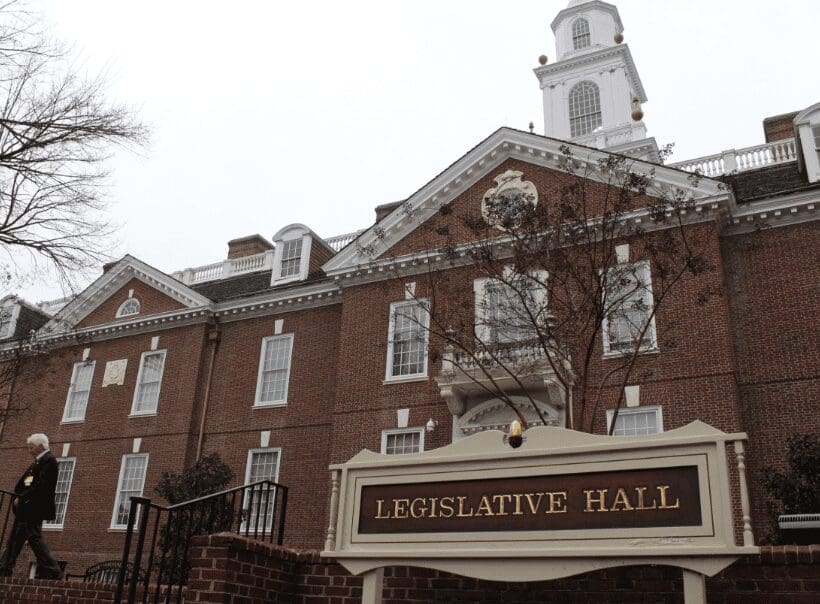A proposed law that intends to hold state legislators accountable for unethical behavior was showcased in the second of a series of press conferences each Wednesday by the Republican Party.
House Bill 261, sponsored by Rep. Mike Smith, R-Pike Creek, would establish the Office of Legislative Ethics for the General Assembly to ensure that valid allegations of wrongdoing by state legislators are thoroughly investigated.
The goal is to hold legislators accountable.
While there’s already ethics committees in the House and Senate, only fellow lawmakers, and sometimes legislative staff, are allowed to submit complaints.
Smith’s bill would broaden the accessibility of filing complaints and allow all Delaware residents to do so.
Allowing any member of the public to request an investigation if they believe a legislator has engaged in unethical or illegal conduct holds lawmakers accountable, Smith said.
“There needs to be an open process where citizens can call them out when they believe something inappropriate has occurred,” he said. “A system where only lawmakers can initiate an investigation against other lawmakers does nothing to further public trust.”
Smith said Wednesday that there’s natural concern that there could be an overabundance of complaints and the office could be overworked, but that is a concern for any public office.
“I think there’s always going to be an intake process, and one of the things that I’ve been preaching… is the state of Delaware needs to get a lot better with their IT infrastructure,” he said. “And one of the things we have to get better at is our CRM [customer relationship management] software.”
He said there’s been plenty of examples of ethics violations, but said he didn’t want to cite any out of potential retribution for future bills he brings up.
“But when you have one side dictating every level of government that leads to waste, fraud and abuse on many different angles,” he said. “From people that might be hired with no experience in certain examples, there was one just around police accountability, I questioned exactly what your merit is or what your background is to be able to facilitate that job besides being just a member of a specific party, and many other examples.”
He said the current system that only allows complaints to be submitted from fellow legislators is not effective.
“I don’t think anybody wants to waste their own time knowing what the outcome is when we’re only judging each other, or one side’s judging the other, or one side’s judging themselves,” he said, “and that’s what this office would hopefully try to help combat.”
HB 261 is awaiting consideration in the House Administration Committee.
Another bill was highlighted Wednesday, although its sponsors were not in the press conference so there was no discussion on it.
House Bill 40, sponsored by State Sens. Brian Pettyjohn, R-Georgetown and Bryant Richardson, R-Seaford, would create the six-member Grants-in-Aid Committee to review each GIA applicant’s performance, financial stability and efficiency.
The Grants-in-Aid Bill is one of the ‘money bills’ created and passed by the legislature each year that allocates taxpayer money to assist hundreds of not-for-profit organizations performing work to help Delawareans. These include volunteer fire companies, senior centers, veteran and youth groups and more.
The current bill contains nearly $72 million in total awards.
“The Joint Finance Committee has historically crafted the Grants-in-Aid package,” Pettyjohn said in a statement. “However, they’ve always been understandably preoccupied with writing the multi-billion state operating budget, leaving little time to review GIA applicants or examine expenditures. As a result, there is less accountability of this spending than there should be.”
The six-person committee would also require applicants to provide information and financial disclosures, giving lawmakers better opportunities to evaluate and provide oversight to the investment of taxpayer money.
This is a bipartisan bill that has twice passed the House, Richardson said in a statement.
“Last March, this measure cleared that chamber without a dissenting vote,” he said. “It’s been in the Senate Executive Committee ever since. We will renew our efforts to urge the Democrat legislators controlling that committee to release it and place it on the Senate agenda for action. Since the House Democrats and Republicans agree on the merits of this bill, we think it’s worthy of consideration by our chamber.”
HB 40 is waiting to be heard in the Senate Executive Committee.
Also in the press release, Rep. Bryan Shupe, R-Milford, announced he will soon introduce a bill to prohibit any non-government organization employing a legislator who helps write the state capital budget or the Grants-in-Aid Bill from receiving money through these bills.
Bryan Shupe is the chief executive officer of Delaware LIVE News.

Raised in Doylestown, Pennsylvania, Jarek earned a B.A. in journalism and a B.A. in political science from Temple University in 2021. After running CNN’s Michael Smerconish’s YouTube channel, Jarek became a reporter for the Bucks County Herald before joining Delaware LIVE News.
Jarek can be reached by email at [email protected] or by phone at (215) 450-9982. Follow him on Twitter @jarekrutz
Share this Post





